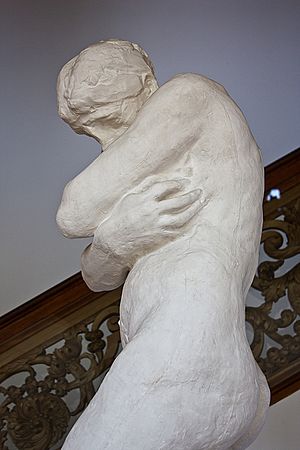Shame facts for kids
Shame is a strong emotion that makes you feel bad about yourself. It often happens when you think you've done something wrong or broken a rule that your family, friends, or society expects you to follow. You might feel shame even if no one else knows what you've thought or done. It's a feeling that makes you want to hide or disappear.
Contents
What is Shame?
Shame is a powerful feeling that can make you feel small or worthless. It's different from guilt, which is about feeling bad about an action. Shame is about feeling bad about yourself as a person. For example, if you accidentally break a vase, you might feel guilty about breaking it. But if you lied about breaking it, you might feel shame about being a liar.
How Does Shame Feel?
When you feel shame, you might experience several things:
- You might want to hide or disappear.
- Your face might get red, or you might look down.
- You might feel a knot in your stomach.
- You might feel like you're not good enough.
- You might avoid looking people in the eye.
These feelings are often linked to what we believe others think of us.
Why Do People Feel Shame?
Shame often comes from our social environment. Every group, like a family, school, or country, has rules and expectations. When someone feels they have not met these rules, they might feel shame. This can happen for many reasons:
- Breaking rules: If you do something that is considered wrong by your group, like cheating on a test.
- Not meeting expectations: If you fail at something important, like a sports competition, and feel you let others down.
- Being different: Sometimes, people feel shame because they are different in a way that society doesn't always accept.
- Personal thoughts: You can also feel shame about thoughts or feelings that no one else knows about.
Shame can be a way our minds try to make us fit in. It signals that we might have done something that could cause others to reject us.
Shame and Society
Shame is deeply connected to how we live together in groups. Different cultures and societies have different ideas about what causes shame. What might be shameful in one place might not be in another.
How Society Uses Shame
In the past, and even today, shame has been used to control people's behavior.
- Public shaming: Historically, people who broke rules might be shamed publicly. This was meant to punish them and warn others.
- Social norms: Shame helps us learn what is acceptable and what is not. It encourages us to follow social rules. For example, if you feel ashamed after being rude, you might try to be more polite next time.
However, too much shame can be harmful. It can make people feel isolated and unwilling to try new things.
Dealing with Shame
It's important to understand that everyone feels shame sometimes. It's a normal human emotion. How you deal with it can make a big difference.
Healthy Ways to Cope
- Talk about it: Sharing your feelings with a trusted friend, family member, or counselor can help. It shows you're not alone.
- Learn from it: Think about why you felt shame. Was there something you could have done differently? Use it as a chance to grow.
- Practice self-compassion: Be kind to yourself. Remember that everyone makes mistakes. Treat yourself with the same understanding you would offer a friend.
- Forgive yourself: If you did something wrong, apologize if needed, and then try to move on. Holding onto shame for too long can be unhealthy.
When Shame Becomes a Problem
Sometimes, shame can become too strong or last too long. If you constantly feel ashamed, or if it stops you from living your life, it might be a good idea to talk to an adult you trust or a school counselor. They can help you understand and manage these feelings.
Images for kids
-
Person hiding face and showing posture of shame (while wearing a Sanbenito and coroza hat) in Goya's sketch "For being born somewhere else". The person has been shamed by the Spanish Inquisition.
See also
 In Spanish: Vergüenza (sentimiento) para niños
In Spanish: Vergüenza (sentimiento) para niños
 | Aaron Henry |
 | T. R. M. Howard |
 | Jesse Jackson |




